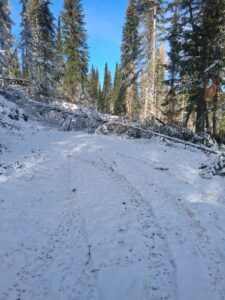April, 2015 — Unpredictability.
This morning, a snowshoe hare hopped across my line of sight, still completely and unfortunately white in the face of our disappeared winter. It was in a hurry, as if it knows how well it stands out against the forest. It was a poignant sighting. I felt a bit of grief that such a well-adapted critter should become so exposed by the vagaries of our odd weather. Life is hard enough for snowshoe hares, what with coyotes and bobcats and owls and eagles, without taking their snow away from them.
Perhaps it doesn’t notice. I doubt that it looks down at its ermine fur and thinks, “C’mon! Change!” But maybe it does. Maybe that’s why it’s moving so fast today, because it somehow intuits that it’s extra vulnerable during this early spring.
Why, as a member of a top-of-the-food-chain species, that small event should move me emotionally, I’m not sure, but it has something to do with the inevitable and the unexpected running head-on into each other. It’s inevitable for snowshoe hares that they will remain white until sunlight achieves a certain angle of approach to my woods as a result of the earth’s annual chase around our neighborhood star.
The argument of global warming aside, this has been a damned weird winter. Of course, it is officially spring now by the calendar, but blooming daphne before the first of April and the growing green haze on south-facing slopes — not to mention the tick population — is far out of the ordinary for this time of year in Montida.
This is an anomaly, surely, as is the weather that kept the Northeast buried for most of the winter; part of a big “pattern disturbance” in the way things “normally” happen. Folks in the East moved a lot more snow than most of them have ever had to deal with in their lives. Out here in the warm, warm West, I skied seven times this year, and had a really good ski day about four times. The unexpected weather has raised hell with our patterns of living.
In the long term of geological time, this may not seem like a big deal. We will quite possibly have a “normal” winter next year. I will get to ski more often than I did this year and the folks in Boston won’t have to struggle so hard to keep moving. In the short term, though, which is where we humans tend to live, this seasonal aberration is somewhat like the sudden appearance of cancer or the advent of Alzheimer’s. Unexpected, concerning and highly inconvenient.
I have a friend who just moved his wife, whom he loves very much, into a home for Alzheimer’s patients. He has struggled mightily not to have to do this, but it has come to a place where he has no other choice. He is like the hare I saw this morning, caught out, mightily exposed, and not yet able to adapt.
My friend will eventually adapt, as will the hare — unless it gets eaten. What gives me pause is the knowledge that it’s not the hare’s fault it’s still white in an unexpectedly brown world. It’s being the best hare it can be. Yet, by the nature of its inevitable “hare-ness,” it is in extra danger.
My friend, by his nature, is being the best human he can be, and if you know this guy, you know he’s a really good human. He may not be in extra danger physically because of his predicament, but he is exposed emotionally and spiritually by an unpredicted turn of events, and has been for some time. He — and she — have been fighting to stay ahead of the inevitable for a number of years. But, the disease has caught up with them now, like spring has caught up with the rabbit — ahead of schedule, unstoppable and completely not their fault.
Whether we know it or not, or are willing to admit it, their struggle is ours. It is good to remember that we all face the inevitable, that we are all born to die. It is good to remember that we all face the unexpected, that winters disappear ahead of schedule and so do people we love. So, we should enjoy our winters as we can and tell the people we love that we love them. We never know when the unpredictable might take them away.
Dedicated to the memory of Mitchell R. Compton, Sr. (June 6, 1928 — March 28, 1986) and Amanda Mariam Compton (October 1979 — March 1983).
This is from Sandy Compton’s book, The Scenic Route: Life on the road between Hope and Paradise.

